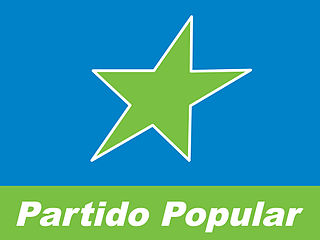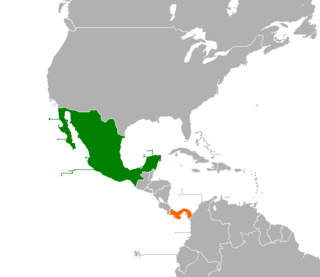The Republican Party (in Spanish: Partido Republicano, PR) was a Panamanian right-wing political party.

Spanish or Castilian is a Romance language that originated in the Castile region of Spain and today has hundreds of millions of native speakers in the Americas and Spain. It is a global language and the world's second-most spoken native language, after Mandarin Chinese.

Panama, officially the Republic of Panama, is a country in Central America, bordered by Costa Rica to the west, Colombia to the southeast, the Caribbean Sea to the north, and the Pacific Ocean to the south. The capital and largest city is Panama City, whose metropolitan area is home to nearly half the country's 4 million people.
A political party is an organized group of people, often with common views, who come together to contest elections and hold power in the government. The party agrees on some proposed policies and programmes, with a view to promoting the collective good or furthering their supporters' interests.
Its distant origins lie in the Liberal Renewal Party (PLR) founded in 1932. The PR was created in 1960 by José Dominador Bazán and Max Delvalle and Eric Arturo Delvalle, all of them Jewish and backed by the Jewish business community. [1]
Max Delvalle Levy-Maduro was a Panamanian politician who served as vice president from 1964 to 1968 and briefly served as acting president in 1967.

Eric Arturo Delvalle Cohen-Henríquez was a Panamanian politician. He served as Vice President under Nicolás Ardito Barletta. Following the disputed 1984 election, and after Barletta's forced resignation, Delvalle served as President of Panama from 28 September 1985 until 26 February 1988.
The PR supported the Roberto Francisco Chiari Remón administration in 1960-1964 and the Marco Aurelio Robles administration in 1964-1968. [2] José Dominador Bazán was briefly Vice-President to Arnulfo Arias in his 11-day government of 1968, despite Arias' well-known anti-semitism. [3] The PPR survived the period of suspension under Omar Torrijos (1969-1981) and did not participate in the 1980 balloting. [4]

Roberto Francisco Chiari Remón was the President of Panama in 1949 and from 1960 to 1964. He belonged to the Liberal Party.
Marco Aurelio Robles Méndez was President of Panama from October 1, 1964 to September 30, 1968. He studied at the University of Panama and at the Sorbonne. Before his presidency, he served on diplomatic missions in France and United Kingdom and also as Minister of Justice (1960-1964).

Arnulfo Arias Madrid was a Panamanian politician, doctor, and writer who served as the President of Panama from 1940 to 1941, again from 1949 to 1951, and finally for eleven days in October 1968.
The PR joined the National Opposition Front (FRENO), a coalition of eight parties, in 1979. [5]
The party was reborn officially on 30 June 1981 [6] with a view to participating in the 1984 elections, though this time the 'Jewish vote' was more widely dispersed. Bazán and the Delvalles were again at its head, and the party was even more clearly allied to the country's wealthy elite, with policies of untrammeled free enterprise and embryonic authoritarianism. [7]
It joined the UNADE coalition behind official candidate Nicolás Ardito Barletta in 1984, winning 2 seats. Eric Arturo Delvalle became First Vice-President, taking over the presidency when Nicolás Ardito Barletta was overthrown by the military on 27 September 1985, but he in turn was ousted on 27 February 1988 when he tried to dismiss Defense Forces chief Gen. Manuel Noriega. [8] He refused to accept the action of the National Assembly in dismissing him from the latter post, and continued to be recognized thereafter as constitutional chief executive by the US government. [9]

Manuel Antonio Noriega Moreno was a Panamanian politician and military officer who was the de facto ruler of Panama from 1983 to 1989. He had longstanding ties to United States intelligence agencies; however, he was removed from power by the U.S. invasion of Panama.
The Manuel Noriega’ regime provoked a split in the RP. The PR joined the official COLINA coalition for the 1989 elections, but the majority of the legitimate leadership of the RP participated in the ADOC coalition. [10]
The PR was abolished by the Electoral Tribunal on 1 July 1991. [11]






